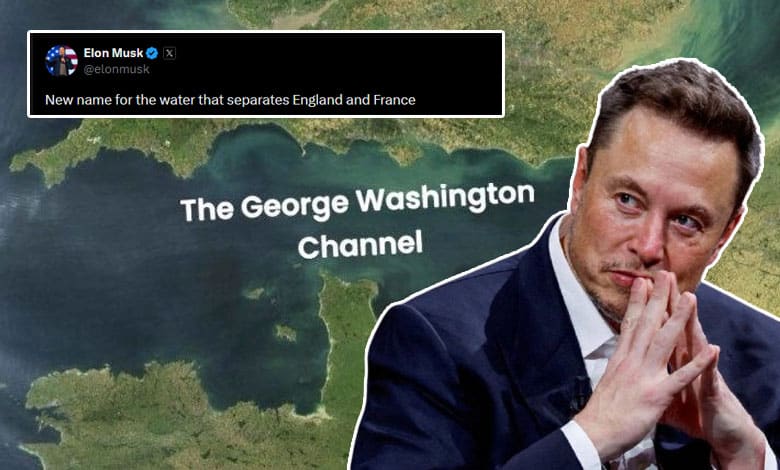Elon Musk Tweets Renaming English Channel to ‘George Washington Channel’ – Is This the Beginning of a New World Order?

In an unexpected and controversial tweet, tech mogul Elon Musk has suggested that the English Channel – the body of water separating England and France – be renamed the “George Washington Channel.” The proposal, which has sparked significant attention and debate, has raised questions about Musk’s intentions and whether this marks the beginning of a new era in geopolitics.
Table of Contents
Musk’s tweet, which he posted late last night, reads: “Time to rename the English Channel to the George Washington Channel. A symbol of freedom, democracy, and the future.” The tweet quickly went viral, with thousands of replies ranging from those supporting the idea as a tribute to American history to those questioning whether Musk was making a political statement.
A Tribute to George Washington, or Something More?
On the surface, the proposal could be seen as a tribute to George Washington, the first President of the United States and a founding figure of democracy and freedom. Washington is a global symbol of liberty, particularly in the context of the American Revolution and its role in challenging European powers, including Britain.
Also Read: Shocking Revelation: CIA Claims COVID-19 Likely Originated from a Chinese Lab
However, many are asking whether this suggestion is more than just a gesture of admiration. Could Musk, whose ventures and statements often have far-reaching implications, be signaling something more? Given Musk’s global influence and his penchant for stirring up controversy, some speculate that the renaming of the English Channel could symbolize a shift in global power dynamics, possibly even a subtle nod to a new American role in the geopolitical landscape.
A New Era or a New Conflict?
The most provocative question raised by Musk’s tweet is whether this is an early indicator of a looming shift in the balance of power between Europe and the United States. Some commentators have speculated that Musk, a billionaire entrepreneur and CEO of major companies like SpaceX and Tesla, may be hinting at a future where the United States assumes a more direct influence over the United Kingdom – perhaps even in a manner that could resemble historical patterns of empire and colonization.
This has led to a flood of speculation. Is this a symbolic gesture foreshadowing a shift in control over the United Kingdom? Could the U.S. be preparing to assert a new kind of dominance in Europe, or is this just another example of Musk’s flair for the dramatic? Could Musk’s suggestion represent the start of a new global order, or is it merely a fleeting idea that will fade away?
Environmental and Cultural Ramifications
There are also concerns that Musk’s proposal might overlook the deeper, historical, and cultural significance of the English Channel. For centuries, the Channel has represented not just a geographic boundary, but a cultural one, standing as a powerful symbol of Britain’s identity and its relationship with mainland Europe. Changing its name could be seen as an affront to those who hold this heritage dear.
Moreover, the English Channel plays a significant role in the environmental and economic landscape of Europe. With its strategic importance as a major shipping route, renaming it could raise concerns about the implications for international trade, maritime security, and environmental protection.

The Political and Diplomatic Repercussions
If the suggestion were to gain traction beyond Twitter, it could spark diplomatic tensions between the United Kingdom, France, and the United States. The name of the English Channel is deeply entrenched in both British and French history, and any change would likely face strong opposition from those who believe that such a move would be disrespectful to the long-standing cultural and national identities of the two countries.
For now, however, it seems likely that Musk’s tweet is more of an eccentric idea than an actual policy proposal. Despite his track record of shaking up industries, it remains to be seen whether this new suggestion will lead to any meaningful shifts in international relations, or if it will simply remain an interesting footnote in Musk’s long history of provocative statements.
Is This a Beginning of New World Order, or Just a Tweet?
For the time being, the idea of renaming the English Channel to the “George Washington Channel” appears to be just a provocative tweet from one of the world’s most influential figures. While the suggestion has sparked discussions on everything from global politics to American cultural influence, it is far from clear whether it signals a new era or simply another moment of attention-grabbing from Elon Musk.
As the tweet continues to spark debates across social media and beyond, one thing is certain: Musk’s comments have reignited conversations about the future of global power, history, and the cultural forces shaping our world. Whether this leads to any lasting change or is soon forgotten remains to be seen.
The “New World Order” Concept:
The term “new world order” has been used throughout history to describe significant shifts in the global political landscape, often linked to changes in the balance of power and international relations. Initially coined during the post-World War I era by figures like Woodrow Wilson, the phrase has evolved over time.
Wilson envisioned a world governed by international peace through mechanisms like the League of Nations. Later, during World War II, Franklin D. Roosevelt and others used it to describe the Axis powers’ ambitions. Following the Cold War, the phrase resurfaced with Mikhail Gorbachev and George H. W. Bush, marking a period of cooperation between great powers.
The end of the Cold War, particularly with the unipolar dominance of the United States, marked a new geopolitical reality, with Bush emphasizing American leadership as central to shaping the emerging world order. Today, discussions about a “new world order” continue to stir debates on global governance and power shifts, with some interpreting it as the potential rise of American influence, while others question its implications for the future.
